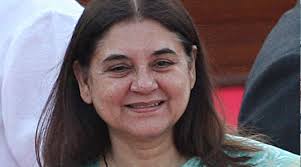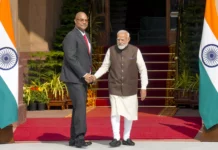 NEW DELHI: Under fire for her remarks making sex determination tests legal, Women and Child Development Minister Maneka Gandhi today told Rajya Sabha that it was her “personal view” and “not a policy statement”.
NEW DELHI: Under fire for her remarks making sex determination tests legal, Women and Child Development Minister Maneka Gandhi today told Rajya Sabha that it was her “personal view” and “not a policy statement”.
Gandhi said this while replying to supplementaries relating to questions on gender gap in the country.
“But mine was not a policy statement…that was my suggestion,” she said, adding that it was nothing more her “personal view”.
The minister at the same time said while currently the focus was on arresting people doing ultrasound, it was a fact that even a police constable has the clout to force people carrying out such tests to inform him whether a lady is giving birth to a male or a female child.
Media reports had last month quoted Gandhi as saying that the 20-year-old Pre-Natal Diagnostic Techniques (Regulation and Prevention of Misuse) Act, 1994 (PNDT) has been a “failure”.
“Make sex determination tests legal. Let the parents know whether the unborn child is a girl or boy, and then we, the lawmakers should start tracking the development of the child from thereon,” Gandhi had then reportedly said, which she did not deny in the Upper House today.
The minister has for some time been batting for legalizing sex determination tests and pushing a plan wherein the government tracks the development of the unborn child, whose gender has been established through ultrasound.
Maneka’s remarks were slammed by activists, who had said that tracking about 50,000 registered ultrasound machines was much easier than a million pregnant women.
Replying to supplementaries, she said, “we have 50,000 ultrasound machines…because we feel so strongly about it, we tend to focus on arresting the ultrasound people.”
Admitting that “female sex ratio is something that is worrying us as well,” she informed the House that under the WCD Ministry’s ‘Beti Bachao, Beti Padhao’ campaign, the government is targeting 100 districts across the country with the worst child sex ratio in the first phase.
The minister also informed the House as per the Global Gender Gap Report 2014 by World Economic Forum, India ranks at 114 in respect of Global Gender Gap index, among 142 countries in the world, while as per the same report of 2013, it ranked 101 among 136 countries.
“The worsening of the GGI in the year 2014 compared to the year 2013 has occurred because of low female labor force participation rate (LFPR) in the category of Economic Participation and Opportunity,” she said.
Maneka said while she agrees that the participation of women in workforce in India is much lower, she said that one of the reasons was that their contribution in household work is not taken into account. She felt that putting a monetary value to their work will improve this ratio.
In a written reply, she said the reason for India’s decline in regard to political empowerment from 9 to 15 is that while India’s position remained unchanged during the period, some countries improved their score and got higher rank.
Replying to concerns about budget cut in her ministry, Gandhi said,” we could suffer from a cut but I have been assured that most of the money would be restored”.
She said the funds that have been slashed from the Budget have gone to states and if they are involved in similar schemes, the problem can be resolved.
As some members said this does not amount to restoration of the budgetary cut, Gandhi said,” From my ministry, I have written for most of the cut to be restored. They said that they will.” -PTI






